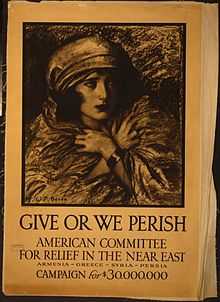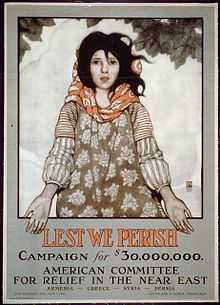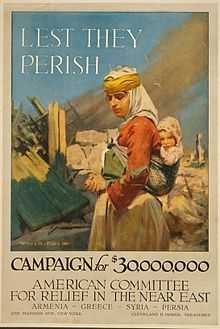Near East Foundation
The Near East Foundation (NEF), formerly the American Committee for Armenian and Assyrian Relief (ACASR),[1] and later the American Committee for Relief in the Near East is a Syracuse, New York-based American international social and economic development organization established in 1915. It is distinguished as the United States’ oldest nonsectarian international development organization. NEF has pioneered many of the strategies employed by the world’s leading development organizations. Since its founding, NEF has worked with partner communities in 40 countries to improve millions of lives in the Near East, Middle East, and Africa.
Mission and focus

The Near East Foundation's mission is to help build more sustainable, prosperous, and inclusive communities in the Middle East and Africa through education, governance, and economic development initiatives. Every member of the NEF field staff is from the region in which they work.
NEF is an operational NGO with projects in seven countries: Armenia, Egypt, Jordan, Mali, Morocco, the Palestinian Territories, and Sudan. In these countries, NEF works with disadvantaged social groups including people coping with conflict and climate change, facing exclusion from civic life, and isolated by their environment.
Working with local partners, NEF programs directly improve lives by helping vulnerable people overcome poverty and other challenges through development initiatives that deliver short-term solutions and build change in the long-term. The organization has four core program areas: Peacebuilding, Civic Engagement and Education, Sustainable Agriculture and Natural Resource Management, and Microenterprise Development.
NEF activities are rooted in its "Knowledge, Voice, and Enterprise" framework. This holistic approach is guided by the principle that to take a leadership role in the development of their communities and countries, individuals require opportunities and tools: the knowledge to participate in civic and economic life, a voice in public decisions that affect their wellbeing, and a means of making a meaningful living.
Current projects include: environment and natural resource management; agriculture and rural development; urban development and rehabilitation; micro-finance, community-based and bank-guaranteed lending; micro-enterprise promotion and income generation; employment and job creation; human resource development and civil society building; leadership and institutional development; girls and women's development and education, basic education and literacy.
Project partners include local and international non-governmental organizations, bilateral and multilateral donors, foundations, financial institutions, and government ministries.
History

The organization began in 1915 when Cleveland H. Dodge, with the help of President Woodrow Wilson, led a group of New York leaders in forming the American Committee for Armenian and Syrian Relief (ACASR), a response to Ambassador to Constantinople Henry Morgenthau's urgent plea for assistance to save victims of the Armenian Genocide and Assyrian Genocide and deportations of 1915. By the summer of 1919, the American Committee was sufficiently established that the King–Crane Commission secured automobiles from it to be dependent as little as possible upon other than American resources, while the Commission conducted their survey of Near Eastern public opinion.[2] From 1915 to 1930, ACASR saved the lives of over a million refugees, including over 130,000 orphans, and mobilized Americans to raise over $100 million for emergency relief and services. Nearly 1,000 U.S. citizens - men and women - served overseas building hundreds of orphanages, vocational schools, and food distributions centers. Thousands more volunteered throughout the U.S. in service to the refugees
In 1930, ACASR was renamed the Near East Foundation, [3] reflecting the organization's shift in emphasis from relief toward long-term social and economic development. Subsequently, NEF focused its efforts on health, education, agriculture, and vocational education, initially in the communities where it had provided humanitarian relief. Its geographic focus expanded to countries throughout the Middle East and Africa.
During this time, NEF pioneered participatory social and economic development – helping people take control of development in their own community at every stage – based on the idea that activities, resources, and expertise can successfully improve the lives of disadvantaged, impoverished people.
Impact

During almost a century of service, NEF has partnered with communities in 40 countries to improve millions of lives, and has played a crucial role in establishing the American philanthropic tradition.
The relief effort that launched the organization in 1915 was the first broad national appeal of its kind to solicit funds from the American public, and it was unique in its use of media outlets and support from celebrity spokespeople and citizen volunteers alike. This effort grew and gave birth to what is now known as “citizen philanthropy” – appealing directly to the public to support humanitarian work overseas. This model of philanthropy is used today by a majority of non-profit organizations around the world.
When NEF established the practice of working in tandem with foreign governments and local organizations to improve the lives of citizens, it was nearly unprecedented. NEF has since provided the model for many of today’s well-known development organizations, including the U.S. Agency for International Development (USAID) and the Peace Corps. It has also left a legacy of enduring development institutions it had helped create that continue as centers of innovation and service, including the American University of Beirut’s Faculty of Agriculture and Food Science, American University in Cairo’s Desert Development Center, Ahwaz Agricultural College in Iran, Center for Development Services in Egypt, and dozens of others.
Partnership with Syracuse University
In 2010, the Near East Foundation moved its headquarters to Syracuse University in Syracuse, New York. At Syracuse University, NEF engages faculty and students in its international development work through strategic partnerships with the Maxwell School of Citizenship and Public Affairs, the S.I. Newhouse School of Public Communications, and the Whitman School of Management. NEF works frequently with experts in the Program for the Advancement of Research on Conflict and Collaboration (PARCC).
Affiliates
- Near East Foundation - Center for Development Services (CDS) - Cairo, Egypt
- Near East Foundation - Sudan
- Near East Foundation - West Bank/Gaza
- Near East Foundation - Amman, Jordan
- Near East Foundation - New Development Foundation - Amman, Jordan
- Near East Foundation - Morocco
- Near East Foundation - Mali
Governance
- President: Charles Benjamin
- Vice President and CFO: John Ashby
- Program Officer: Sarah Peterson
- Chair of the Board: Shant Mardirossian
- Egypt Country Director: Alaa Saber
- Jordan Country Director: Khaled Waleed
- Mali Country Director: Yacouba Dème
- Morocco Country Director: Abdelkhalk Aandam
- Palestine Country Director: Salah Abu-Eisheh
- Sudan Country Director: Musa Gismalla
See also
- NEF is a Non-governmental organization and a Private voluntary organization.
References
- ↑ ASKS FOR $5,000,000 TO SUCCOR ARMENIA; American Committee Starts Biggest Undertaking of Mercy Since Relief of Belgium., New York Times, October 4, 1916
- ↑ King-Crane Commission Report, August 28, 1919
- ↑ Protestant diplomacy and the Near East:missionary influence on American policy, 1810-1927, Joseph L. Grabill